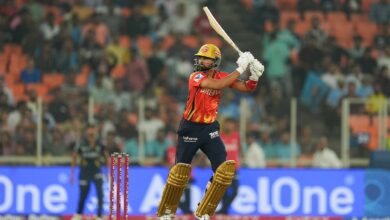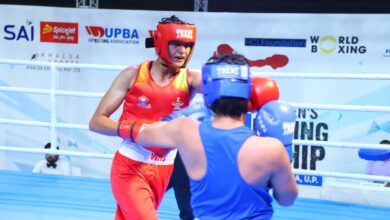From Odisha village without electricity to hockey World Cup spotlight, the journey of India defender Nilam Xess

HE GREW up in a village without electricity. As a child, he helped his parents pick vegetables — potato and cauliflower — on the small farm they own. “Sometimes, I am embarrassed to tell my story,” he says. Then, after a long pause, he adds, “But then I look back and think, ‘wow, I’ve made it so far’.”
Nilam Xess’s village got electricity five years ago. And on Friday, the 24-year-old hockey defender will be under the spotlight inside the 21,000-seater Birsa Munda Stadium, in Odisha’s steel city Rourkela, where he is set to make his World Cup debut against Spain.
Tickets for this match — and for all other World Cup games in Rourkela — were sold out within minutes of going on sale. This, say local officials, is partly because of the sheer love of the game around these parts and also to see the hometown hero in action.
Xess’s hockey story began in Kadobahal, a village on the outskirts of Rourkela, on a dusty and light-brown field. Unlike the state-of-the-art stadium, the local ground in this arid village, with a population less than the capacity of the Birsa Munda Stadium, has two dilapidated goalposts with torn nets. There’s a giant, broken net placed between two bamboo poles to prevent the ball from hitting vehicles on the adjacent road.
Nilam Xess’s trophies at his home in Kadobahal village.
Xess was around seven years old when he first stepped on this ground. “I played with my brother during breaks in school. After coming home, I would help my parents at the farm and in the evening, people in the village would meet for a game of hockey. I used to join them,” he says.
Xess played hockey to pass time in a place where “nothing happens”. And he became a defender because “everyone else wanted to play as a forward and score goals” in the footsteps of Michael Kindo, Dilip Tirkey, Lazarus Barla and Prabodh Tirkey — among the many heroes the tribal belt has produced. Although, Xess admits, he hadn’t heard about them at the time. But then, he never imagined playing for India, either.
Kadobahal, he jokes, isn’t a place for people who dream big. “Current bhi nahi tha (There was no electricity even),” he says. “Forget the world, I didn’t even know what was happening in Rourkela.”
Bipin, his father, says, “We aren’t saying there was a power cut… there was absolutely no electricity. We only started getting power supply in 2017. Until then, we lived in complete darkness.”
It’s no surprise then that from the nuances of tackling and the demands of defending, Xess veers seamlessly into the art of making “dhibaris” (oil lamps). “We couldn’t afford a lamp but we had tiny containers at home. Once they got empty, we washed them and let them dry completely. Then, we made a tiny hole, stuffed some mud in it, poured some kerosene oil and lit it. That’s how we spent our nights,” he says.
Nilam Xess’s father Bipin outside his home on Kadobahal village
Those days, Xess hoped to complete his studies and get a “respectable job”. “Hockey was just a leisure activity, nothing beyond that,” he says.
But that changed in 2010, when he got picked for the sports hostel in Sundergarh. “That’s when I got to know you can make money playing hockey. Izzat milti hai (You earn respect). So I worked hard to become a player. And then, when I saw the London Olympics in 2012, I set myself a goal — to play for India,” says Xess, whose parents borrowed money to buy his hockey sticks and meet other requirements.
A local coach, Tej Kumar Xess, taught him the art of defending. When he got picked for his first national camp, Birendra Lakra — another hockey star from these parts — took him under his wings. “He saw me as his brother and taught me a lot of things I know today: tackling, positioning, how to sneak out of pressure situations on the field…”
These traits have now come to define Xess — the ability to snuff out danger with his sense of positioning, smooth tackling and staying calm during tight situations. And it is these traits that will come in handy when Olympic bronze medalls India open their campaign against a tricky Spain in front of a sell-out crowd.
The new stadium in Rourkela is one of the two venues, apart from the Kalinga Stadium in Bhubaneswar, which will host the 16-team World Cup, from January 13 to 29. And among the thousands in the stands Friday, will be Xess’s parents. “How could you even dream of playing in a World Cup when you are living in a situation like that?” Bipin asks. Xess’s mother Jira says, “But now it’s happening in our own backyard and our son will be playing in it, how can we miss it?”






